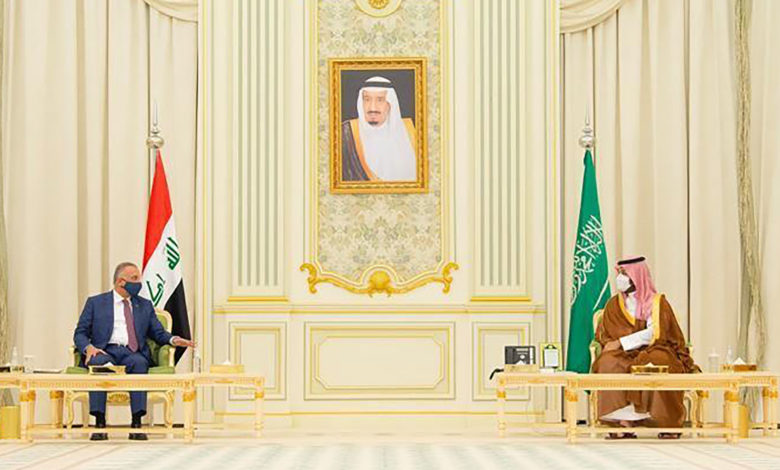A reading in the dimensions of the balanced relationship between Iraq and the Kingdom of Saudi Arabia.

Nizar Hatem
The bilateral relationship between Iraq and the Kingdom of Saudi Arabia has not witnessed since 2003 a qualitative shift identical to the influential weight of both countries in terms of achieving common interests and dedicating the ideal model for relations between the countries of the region.
The Iraqi scene and the reactions:
Perhaps the uniqueness of the Iraqi political scene that followed the overthrow of the previous regime in Baghdad, and the building of its political process on the basis of quotas, may have caused different reactions by the countries of the region according to the different political calculations represented in the openness of some of them to the new Iraqi situation, while others waited for the data produced by the Iraqi arena – negatively and positively – by mapping the democratic process and its transformations related to the elections in choosing the legislative and executive authorities, in addition to the security-disturbed situation due to terrorist acts that claimed the lives of thousands of Iraqi citizens and then the occupation of “ISIS” for important cities in the West and the North, thus representing a difficult test of the will of the Iraqis, which has been able with the power of the fatwa of the religious authority, the armed forces, the popular mobilization forces and the support of the international coalition forces alongside Iran to liberate Iraqi lands and defeat the elements of terrorism.
Successive visits and the appropriate climate:
The heads of successive Iraqi governments since 2006 (Nuri al-Maliki, Haider al-Abadi, and Adel Abdul-Mahdi) have preferred to take the initiative to visit Riyadh and hold discussions with Saudi leaders, which focused in their entirety on ways to improve the bilateral relationship between the two countries and activate the potentials in the economic and security side of the two countries. Thus, these high-level visits have cumulatively contributed to the consolidation of the Iraqi desire and its credibility to extend bridges of relations with the Kingdom on the basis of common vital interests, since after a rupture that lasted – twenty five years – Riyadh took the initiative to open its embassy in Baghdad, and to perpetuate communication between Iraqi and Saudi officials.
This positive interaction, despite of its narrow area and the meager data on the ground, has produced a suitable atmosphere for moving water at the roots of the relationship and revitalizing it after years of dryness.
What gives rise to optimism in this positive bilateral approach is that it is not dependent on the different positions of Saudi Arabia and Iraq towards the countries of the region such as Iran and Turkey, which means a mutual understanding of the independence of the political decision and the determination of its compass according to private accounts and interests.
Iraq is far from the lineups of axes:
The visit of the Iraqi Prime Minister to the Kingdom of Saudi Arabia on March 31-2021, and the accompanying signatures of economic and cultural agreements, came amid a standing ovation expressed by senior officials in the Kingdom, confirming and representing the Saudi conviction in the need to produce the appropriate climate for the growth of relations and common interests, as well as the possible role of the two countries in contributing to defuse tensions in the region. While Al-Kazimi had stressed prior to his visit to the Kingdom that his country would not engage in the lineups of the axes, explaining that Iraq is keen to establish the best relations with the West, the Arab world, Turkey and Iran to give a clear indication that Iraq will not be drawn into bilateral relations at the expense of similar relations with this or that country.
Al-Kazimi and the leaders of the political powers are well aware that the interest of their country lies in building bridges of balanced relations with everyone, especially with the neighboring countries of Iraq, and distancing it from the sharp corners that surround the relations between some countries in the region because in this lies the interest of Iraq.
And because the war raging in the region between any of its countries has negative repercussions on the Iraqi arena, Iraq can – after Al-Kazemi’s successful visit to the Kingdom – play a constructive role in bridging the differences between Saudi Arabia and Iran as well as resolving the long-standing crisis in Yemen and extinguishing its burning fire.
The role of the media:
In order for the bilateral relationship between Iraq and the Kingdom of Saudi Arabia to continue its positive momentum, the media in both countries should be balanced when describing this relationship, away from slogans which some of its owners went to characterize the visit of Al-Kazemi to Riyadh as representing the return of Iraq to its Arab embrace, as if Mesopotamia was out of this embrace, forgetting that Baghdad has good fraternal relations with all Arab countries, and the Gulf countries in particular in parallel with the relationship with both Ankara and Tehran.


